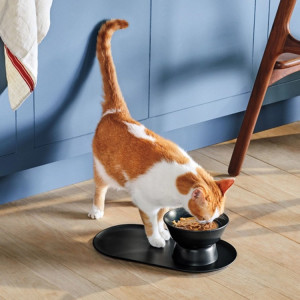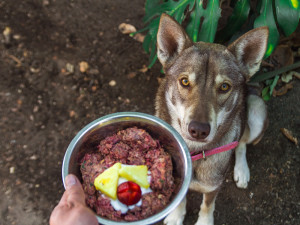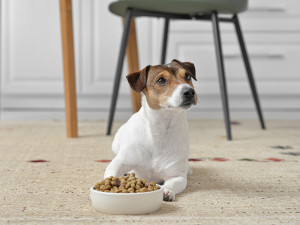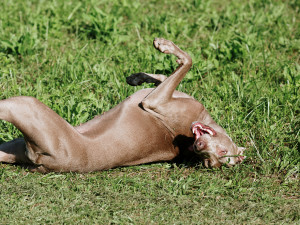Unraveling the Grain-Free Dog Food Debate: Examining the Potential Link to Canine Heart Disease
Integrative veterinarian Dr. Lindsey Wendt shares advice on a sometimes controversial, always changing topic.
If you’re a dog parent who’s always looking for the best food to feed your pup, you’ve probably heard many things about grain-free diets — including their possible link to a heart disease called dilated cardiomyopathy (DCM). There’s been a lot of confusing, changing information on this topic, and that makes it hard for pet parents to make informed decisions. So, we chatted with holistic veterinarian and Kinship Collective member Dr. Lindsey Wendtopens in new tab to get the latest scoop.
A quick history of grain-free foods and DCM
First, a little background. Dog foods free of rice, oats, barley, and other grains came onto the scene around 2007. Not coincidentally, this was about the time the gluten-free trend took off in human nutrition. These dog-food diets, which feature ingredients such as peas, lentils, and sweet potatoes in place of grains, were touted (by their manufacturers) as a healthier alternative to grain-inclusive dog foods. But in 2017, veterinary cardiologists started noticing an increase in DCM among dogs who were fed grain-free diets — leading many concerned pet parents to wonder, Is grain free bad for dogs?
A year later, the FDA took notice and began collecting opens in new tab veterinarian-reported cases of diet-associated DCM. But the FDA’s updates have been few and far between. And grain-free diets are a popular, heavily marketed option often recommended at pet stores. Those factors have left well-intended pet parents struggling to get accurate information.
The latest research between grain-free foods and DCM
While the connection between grain-free diets and DCM has become more well known, the reason behind the link still isn’t 100 percent clear. The somewhat confusing conclusion: It’s not the lack of grains in a diet that seems to cause an issue; the ingredients used in place of grains appear to be the culprit (but not all of them). Pulses opens in new tab — a group of legumes that includes peas, lentils, chickpeas, and beans — appear to be most concerning.
“Based on a retrospective evaluation of the cases that have been collected, researchers have found that most reported cases involved dogs fed extruded dry food diets,” Dr. Wendt says. “There has been no significant association with DCM and a specific protein source. But in 91 percent of the cases, the affected dogs were on grain-free diets. In 89 percent of the cases, the diets included peas, and in 62 percent, they included lentils.” Those numbers are certainly compelling.
Why is grain-free bad for dogs?
Problems with grain-free dog food may come down to something called anti-nutritional factors. Dr. Wendt explains: “Anti-nutritional factors are something that a plant contains that in the wild discourages animals or people from eating it because it would make them sick.” She goes on to say that the anti-nutritional factors of these ingredients could be worse if they aren’t “cooked or treated properly” but adds that this is not something experts test. She continues: “Based on the strong connection between peas, in particular, and DCM, I would say there’s no benefit at this time to feeding your dog a diet with peas as a main ingredient source.”
What dog breeds should avoid grain-free food due to the risk of DCM?
Dr. Wendt says DCM has started to spread beyond the usual suspects: “Traditionally, there were only certain breeds that were affected by DCM. While DCM is multifactorial, there is a genetic component in the breeds that classically had the disease. These include Dobermans, Great Danes, Boxers, Cocker Spaniels, and Standard and Giant Schnauzers. But now we’ve started to see diet-associated DCM over-represented in Pit Bulls, German Shorthair Pointers, Mini Schnauzers, and French Bulldogs.”
What do you do if your dog is diagnosed with DCM?
As is often the case, Dr. Wendt says early detection is key: “If you catch the disease early enough, and you supplement the pet and take them off the grain-free diet, some of the changes to the heart can reverse, and the heart can start repairing itself.”
She adds that you can also do your part to get the word out about diet-associated DCM: “DCMdogfood.comopens in new tab is maintained by a group of interested veterinarians and other people. They investigate every single case of DCM, and as a pet parent, you can tell them if your dog was diagnosed. So, that’s an action you can take if you want to help this group gather data and information. You can also advocate for your veterinarian to report the diagnosis to the FDA, so their numbers are more accurate.”
What are the signs of heart disease in dogs?
Early signs of heart disease in dogs may be mild or nonexistent. This is called the “pre-clinical” phase. More advanced symptoms include:
Swollen abdomen
Weakness and lethargy
Difficulty breathing (labored, muffled, or crackling breathing)
Panting
What should I consider when choosing dog food?
Picking the right food for your pup has always been daunting, and questions about the safety of grain-free foods just add to the confusion. Dr. Wendt has some helpful tips for pet parents looking to make the best choices based on what we now know about diet-associated DCM.
“Don’t just look at the description on the front of a dog food bag,” she says. “Make sure to look at the ingredient list on the back of the bag. If peas are in the top 10 ingredients, it’s cause for concern. If pulses are further down on the ingredient list, it’s less likely to be correlated with DCM. And be cautious about products that have limited ingredients or ingredients that have not historically been used. For example, peas were rarely used in dog food [in the past], and now quite a few diets include them.”
That’s good advice for dog foods, but do grain-free treats deserve the same scrutiny? According to Dr. Wendt, those might be OK. “If the diet you’re feeding is grain-based, feeding a few grain-free treats here and there is likely not an issue. But as a general rule, I’d still avoid peas. They are so tightly associated with DCM that there’s no good reason to introduce that level of concern.”
OK, so the connection between DCM and grain-free foods (and peas in particular) is strong. But does that connection really trump all the claims that grain-free diets are better for dogs? After all, grain-free foods are often billed as a good option for dogs with food allergies. As it turns out, the logic (or marketing) behind that claim is flawed. According to Dr. Wendt, “A lot of people are under the misconception that dogs with food allergies are usually allergic to grains. And while some dogs do have grain allergies, the vast majority are protein allergies. So, the idea that a grain-free diet is the highest quality diet for the average dog is incorrect.”
Based on all of this information, there may be better options for pet parents who have been contemplating a grain-free diet. And while there’s no such thing as a universally appropriate nutrition recommendation, Dr. Wendt offers a solid starting point.
“Choose a balanced, reliable, grain-inclusive diet,” she says. “And then take the money you would have spent on an expensive grain-free diet and invest in fresh-food protein toppers, like plain cooked chicken or cooked egg whites. This approach won’t work for dogs with disease conditions where they shouldn’t have extra protein, but it’s a great option for most dogs.”
FAQs (People also ask):
1) How can I monitor my dog’s heart health?
Learn how to give your dog a DIY health exam; you can check their vitals, such as heart-rate and pulse, at home. Keep an eye out for panting, lethargy, lack of appetite, and any major behavioral or health changes. Take your pup straight to the vet if you’re worried about their heart.
2) What are the signs of heart disease in dogs?
Loss of appetite; coughing; swollen abdomen; weakness and lethargy; difficulty breathing (labored, muffled, or crackling breathing); weak pulse; and panting are all potential signs of heart disease in dogs.
3) Is grain-free food the only potential cause of DCM in dogs?
No. DCM can be hereditary, and there have also been cases of non-hereditary DCM found in dogs fed diets that include grain.
4) Do vets recommend grain-free dog food?
Veterinarians may recommend grain-free diets in a case when a dog has a grain allergy, but vets are torn on whether or not grain-free diets are worth it for dogs. Vets have found that peas, in particular, are highly associated with DCM.
References:
Update on Grain-Free Dog Food and Heart Diseaseopens in new tab
DCM in Dogs: Taurine’s Role in the Canine Dietopens in new tab
Disclaimer alert: This article is here to share information. But, much like pineapple on pizza, the topic may be controversial. Meaning, not all vets or pet professionals agree. Because every pet is a unique weirdo with specific needs. So, don’t take this as fact or medical advice. Talk things over with your vet when making decisions, and use your best judgment (about both your pet’s health and pizza toppings).
















